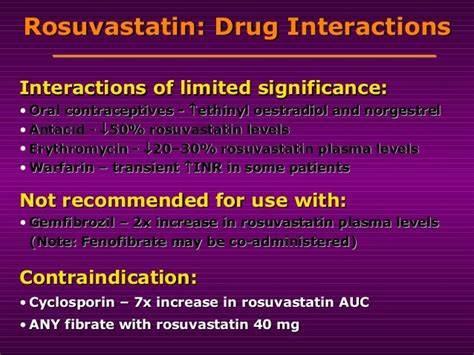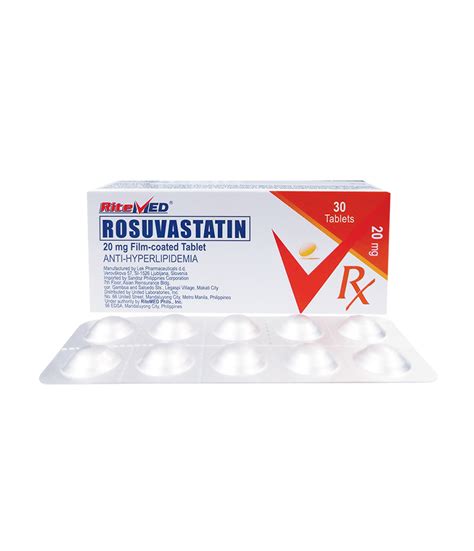Intro
Rosuvastatin is a medication that belongs to the class of drugs known as statins, which are used to lower cholesterol levels in the blood. The 20 mg dosage of rosuvastatin is a commonly prescribed strength for this medication. In this article, we will delve into the world of rosuvastatin, exploring its benefits, working mechanisms, and key information related to its use.
The importance of managing cholesterol levels cannot be overstated. High cholesterol, also known as hypercholesterolemia, is a major risk factor for cardiovascular diseases, including heart attacks, strokes, and peripheral artery disease. Statins like rosuvastatin have been proven to be highly effective in reducing the risk of these conditions by lowering the levels of "bad" LDL cholesterol and triglycerides in the blood, while also increasing the levels of "good" HDL cholesterol.
Rosuvastatin, in particular, has been shown to be one of the most potent statins available, with a significant ability to reduce LDL cholesterol levels. Its efficacy and safety profile have made it a popular choice among healthcare providers for the treatment of hypercholesterolemia and the prevention of cardiovascular events. The 20 mg dosage is often prescribed for patients who require a moderate to high intensity reduction in LDL cholesterol levels.
Rosuvastatin Mechanism of Action

Rosuvastatin works by inhibiting the enzyme HMG-CoA reductase, which plays a central role in the production of cholesterol in the liver. By blocking this enzyme, rosuvastatin reduces the amount of cholesterol produced in the liver, leading to a decrease in the levels of LDL cholesterol and triglycerides in the blood. This mechanism of action also leads to an increase in the levels of HDL cholesterol, further contributing to the reduction of cardiovascular risk.
Benefits of Rosuvastatin
The benefits of rosuvastatin are numerous and well-documented. Some of the key advantages of using this medication include: * Significant reduction in LDL cholesterol levels * Reduction in the risk of cardiovascular events such as heart attacks and strokes * Increase in HDL cholesterol levels * Improvement in triglyceride levels * Reduction in the progression of atherosclerosis, a condition characterized by the buildup of plaque in the arteriesRosuvastatin Dosage and Administration

The dosage of rosuvastatin can vary depending on the individual patient's needs and medical history. The 20 mg dosage is a common starting point for many patients, although some may require higher or lower doses. It is essential to follow the dosage instructions provided by your healthcare provider and to take the medication as directed.
Side Effects of Rosuvastatin
Like all medications, rosuvastatin can cause side effects in some patients. Common side effects include: * Muscle pain or weakness * Headache * Dizziness * Nausea or vomiting * Constipation or diarrheaIt is crucial to discuss any side effects with your healthcare provider, as they can often be managed with adjustments to the dosage or by switching to a different medication.
Rosuvastatin Interactions

Rosuvastatin can interact with other medications, including:
- Other cholesterol-lowering medications
- Blood thinners
- Certain antibiotics
- Antifungal medications
- HIV medications
It is vital to inform your healthcare provider about all medications you are taking, including over-the-counter supplements and vitamins, to minimize the risk of interactions.
Rosuvastatin and Pregnancy
Rosuvastatin is not recommended for use during pregnancy, as it can harm the developing fetus. Women who are pregnant or planning to become pregnant should discuss alternative treatment options with their healthcare provider.Rosuvastatin and Breastfeeding

It is not known whether rosuvastatin passes into breast milk. However, due to the potential risk of harm to the nursing infant, breastfeeding women should discuss the risks and benefits of taking rosuvastatin with their healthcare provider.
Rosuvastatin and Liver Disease
Rosuvastatin can cause liver damage in some patients. Individuals with pre-existing liver disease should be closely monitored while taking this medication, and regular liver function tests should be performed to minimize the risk of liver damage.Rosuvastatin and Kidney Disease

Rosuvastatin can also cause kidney damage in some patients. Individuals with pre-existing kidney disease should be closely monitored while taking this medication, and regular kidney function tests should be performed to minimize the risk of kidney damage.
Rosuvastatin and Diabetes
Rosuvastatin can increase the risk of developing diabetes in some patients. Individuals with pre-existing diabetes should be closely monitored while taking this medication, and regular blood sugar tests should be performed to minimize the risk of diabetes-related complications.Rosuvastatin Warnings and Precautions

Rosuvastatin can cause serious side effects, including:
- Muscle damage (myopathy)
- Liver damage (hepatotoxicity)
- Kidney damage (nephrotoxicity)
- Increased risk of diabetes
It is essential to discuss these risks with your healthcare provider and to report any symptoms or concerns promptly.
Rosuvastatin Overdose
In the event of an overdose, seek medical attention immediately. Symptoms of an overdose may include: * Muscle pain or weakness * Nausea or vomiting * Dizziness * HeadacheRosuvastatin Storage and Disposal

Rosuvastatin should be stored at room temperature, away from light and moisture. Do not flush this medication down the toilet or pour it into a drain. Instead, dispose of it properly, and ask your pharmacist or healthcare provider for guidance on how to do so.
Rosuvastatin FAQs
What is the typical dosage of rosuvastatin?
+The typical dosage of rosuvastatin is 20 mg per day, although some patients may require higher or lower doses.
Can I take rosuvastatin with other medications?
+Rosuvastatin can interact with other medications, including blood thinners, antibiotics, and antifungal medications. It is essential to inform your healthcare provider about all medications you are taking.
Is rosuvastatin safe for pregnant women?
+Rosuvastatin is not recommended for use during pregnancy, as it can harm the developing fetus. Women who are pregnant or planning to become pregnant should discuss alternative treatment options with their healthcare provider.
In conclusion, rosuvastatin is a highly effective medication for managing high cholesterol and reducing the risk of cardiovascular events. The 20 mg dosage is a common starting point for many patients, although individual needs may vary. By understanding the benefits, working mechanisms, and potential side effects of rosuvastatin, patients can make informed decisions about their treatment and work closely with their healthcare providers to achieve optimal results.
We invite you to share your thoughts and experiences with rosuvastatin in the comments section below. Have you taken this medication before? What were your results, and did you experience any side effects? Your input can help others make informed decisions about their treatment. Additionally, if you found this article helpful, please share it with your friends and family who may be struggling with high cholesterol or cardiovascular disease. Together, we can promote healthier living and reduce the risk of cardiovascular events.
